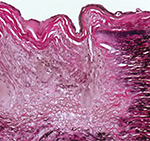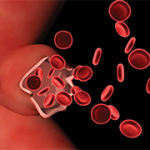The TAKT study also included a group of per-protocol set (PPS) patients, including 16 tocilizumab-treated and 17 placebo-treated patients. In the PPS sensitivity analysis, the HR was 0.34 (95.41% CI 0.11 to 1.00; P=0.0345), indicating longer time to relapse in the tocilizumab group than in the placebo group. In the PPS patients, relapse occurred in seven tocilizumab-treated patients (43.8%) and 11 placebo-treated patients (64.7%).1
Although the primary endpoint was not met in this study, Dr. Tanaka says the secondary endpoints of the trial were met, including time to relapse according to Kerr’s definition. “Each of the five categories of symptoms according to the definition of relapse and imaging evaluation, and exploratory subgroup analyses were consistent with the preference of tocilizumab. These results suggest favor for tocilizumab over placebo in patients with refractory TAK.”
Dr. Nakaoka adds the TAKT study findings “indicate that tocilizumab might be effective for reducing the GC dose in the refractory patients with TAK.”
Next Steps
Dr. Nakaoka says study investigators are currently analyzing the long-term, open-label extension data of the TAKT study.” In Japan, Dr. Tanaka says “post-marketing surveillance is ongoing with all patients with Takayasu arteritis who are treated with tocilizumab to clarify safety and efficacy of the drug.”
Sharon Chung, MD, a rheumatologist and associate professor of medicine at the University of California, San Francisco, School of Medicine, sees the TAKT study as an extremely important first step in studying the potential efficacy of tocilizumab for TAK. She says the big unanswered question is where tocilizumab fits in the treatment spectrum of patients with TAK.
“Treatments we have more experience with are corticosteroids (prednisone and methylprednisolone), methotrexate, azathioprine and TNF inhibitors (infliximab and adalimumab),” Dr. Chung explains. “While we don’t have randomized controlled trials to support the use of these other medications, we do have more clinical experience (decades or longer for some) with these medications as compared to tocilizumab. Therefore, also considering some of the unusual aspects of the study, I would consider tocilizumab for patients who continue to have active disease while being treated with other therapies such as methotrexate, azathioprine, or anti-TNF therapy. This usually means the patient requires high-dose prednisone and these other medications to control disease, and that prednisone cannot be tapered to a safe level without disease flare.”
Although the TAKT study is not conclusive, Dr. Chung says it does suggest tocilizumab therapy may have efficacy, and therefore, it provides strong support for conducting a larger study. “I think one of the most important aspects of this study is that it suggests we might have a new potential therapy for TAK. Patients benefit the most when we have more options for treatment.”


